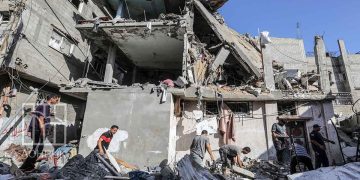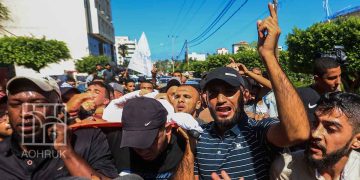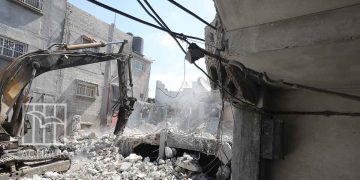Arab Organisation for Human Rights in the UK (AOHR UK) organised a webinar on Tuesday, 27 May 2025, titled: “Is Threatening Sanctions Enough? Europe’s Role in Enabling the Genocide in Gaza.” The webinar was held in response to the recent decisions by the United Kingdom and the European Union to suspend certain trade agreements with Israel, amid the continued genocide and atrocities committed against civilians in the Gaza Strip. These delayed steps have sparked urgent debate about whether such measures are sufficient, what real impact they can achieve, and why Europe continues to apply double standards—imposing swift sanctions on Russia while shielding Israel from meaningful consequences.
The webinar brought together a prominent panel of speakers including: Syed Ibrahim, Member of the Malaysian Parliament and Chairman of the Palestine Committee; Tesh Sidi, Member of the Spanish Parliament; Malik Ben Achour, Member of the Belgian Parliament; Chris Sidoti, Member of the United Nations Commission of Inquiry on Palestine and Israel; Alicia Koutsoulieris, Communications Director at Partners for Palestine; and Jim Moran, former Member of the U.S. Congress. Together, they addressed the legal, political, and humanitarian dimensions of Western complicity in the Gaza genocide, highlighting the need for immediate accountability and the enforcement of binding international obligations.
In his intervention, Malik Ben Achour condemned what he described as the “horrific, inhuman, genocidal” war waged by the United States and Israel on the people of Gaza. He also denounced the “shameful, disgraceful, criminal” complicity of some European governments, both in their silence and in their direct involvement. Without repeating well-known horrors, he focused instead on key observations, starting with a shift in public discourse. He noted that both official and public speeches in Europe, particularly in France, are beginning to use accurate terminology—terms like genocide, ethnic cleansing, and concentration camps—which are now becoming more common and less controversial. This, he said, is largely due to the tireless work of civil society and grassroots mobilisations on social media, which have begun to break the dominance of the Israeli narrative that seeks to obscure and dismiss the crimes.
Ben Achour stressed that while this shift in language is important, words alone are not enough. Concrete governmental actions are urgently needed. He identified two immediate priorities: first, the unconditional delivery of humanitarian aid without Israeli interference, insisting on the independence of humanitarian work; and second, the need for a permanent and final ceasefire. Beyond these emergency measures, he outlined four political priorities that he believes Europe must adopt. These include (1) the suspension of the EU-Israel Association Agreement, (2) a complete halt to arms deliveries to Israel, including addressing the issue of weapons transiting through Belgian territory despite a ban on direct exports in place for 15 years, (3) full support for international legal mechanisms, particularly the ICJ and ICC, including the execution of arrest warrants against Netanyahu and Gallant, and (4) strong condemnation of U.S. threats against ICC staff, which he labelled as shameful.
In conclusion, Ben Achour further stressed the need for a strategic European role in the Middle East. He urged European states to do more to engage diplomatically, economically, and even in defence coordination with Arab countries in order to apply unified pressure on Israel and build a shared vision for lasting peace. He concluded with a firm declaration that what is happening in Gaza affects the future of the entire world, as it tests whether the rule of law applies equally to all people regardless of religion or race. “That is why the question of Palestine is not like others,” he said. “And that is why we cannot give up—and we won’t give up.”
Tesh Sidi began her contribution by reflecting on the political climate in Spain following the events of 7 October. She described how members of parliament and human rights defenders who expressed solidarity with Palestinians were immediately labelled as “terrorists”. This labelling, she explained, was part of a wider attempt to erase the Palestinian people’s right to resist and to silence decades of occupation from the public discourse. She recalled how she and her colleague Manu Pineda took a principled stand from the beginning, insisting that the events in Gaza cannot be understood in isolation but must be seen in the context of over 70 years of military occupation. Sidi welcomed the fact that today the narrative in Spain has shifted, with more people calling what is happening in Gaza a genocide—“the genocide of this century.”
She noted, however, that the Spanish government’s early position in support of Palestine was not sufficient. Despite its reputation among Arab countries for being more sympathetic to the Palestinian cause, Spain has maintained economic and military ties with Israel, including arms agreements and naval operations. Sidi explained that her party had called for an arms embargo since the beginning of the war, but it had not been applied. In response, a new law imposing an embargo on Israel was passed in parliament last week, though it is still awaiting implementation. She emphasised the urgency of applying this embargo now and demanded that Spain treat Israel the same way it treated Russia, making it clear that supporting Palestine is not a slogan—it must translate into action. In addition to the embargo, her party is preparing a new law to suspend all economic agreements with Israel and calling for a total boycott, arguing that the occupation is driven not by religion or nationalism, but by economic profits.
Sidi stressed that Spain, while unique in the EU, must go further in using its influence. She credited Spanish civil society, particularly student movements in universities, for maintaining strong support for the Palestinian cause. Within the coalition government, ministers from her party have consistently backed Palestine and called for more significant measures. She warned that the world is watching the failure of institutions like the UN to stop the genocide, and that if the UN cannot protect Gaza, no one is safe from similar threats. She called for stronger support for international organisations and resistance against the rise of authoritarian policies that seek to delegitimise human rights mechanisms. Sidi also highlighted the vital role of social media and independent journalism in documenting crimes, thanking Palestinian reporters and networks like Al Jazeera for exposing atrocities to the world, despite the censorship of tech companies that she accused of being complicit in Israel’s actions. She concluded by stating that support for Palestine is not marketing—it is a matter of standing on the right side of history.
Malaysian MP Syed Ibrahim opened his remarks by expressing emotional difficulty in addressing the ongoing catastrophe in Gaza, stating he was “lost for words” in the face of immense suffering. He acknowledged the horror of the war, especially with more than 16,000 children killed in nearly 600 days since October 7th, and questioned whether the international community’s response—particularly from European states—had been anywhere near adequate. He pointed to clear evidence of European complicity in the war, citing export licences worth approximately £6.3 billion granted by the European Union to Israel between 2014 and 2022, and noted that Germany alone accounted for 30% of Israel’s arms imports between 2019 and 2023. While he welcomed the decisions by countries like Spain, Belgium, and the Netherlands to halt arms sales to Israel, he criticised the lack of a unified European approach and called for coordinated mobilisation among lawmakers and legal actors to pass binding laws to stop arms deals and enforce embargoes.
Mr Ibrahim sharply criticised the hypocrisy of Europe’s double standards, highlighting the swift sanctions imposed on Russia over Ukraine, while Israel has faced no comparable trade restrictions or financial penalties for its actions in Gaza. He called on the international community—particularly Western nations—to take serious and decisive steps to stop the war and apply real pressure on Israel, which he described as seeing itself as part of the Western world and therefore responsive only to Western pressure. He outlined a clear set of demands: an immediate end to Israel’s military offensive, use of accurate terms such as genocide, apartheid, and criminal policies, the end of all economic relations with Israel, and full humanitarian access into Gaza. He rejected Israeli claims that Hamas is blocking aid, calling such justifications “ridiculous,” and reiterated that Western countries must apply meaningful pressure to ensure aid delivery.
Continuing his call to action, Mr Ibrahim demanded a comprehensive arms embargo on Israel to prevent further civilian casualties and escalation. He also stressed the need for full accountability for violations of international law, including potential war crimes, noting that if the West believes in democracy and international law, it must act accordingly. He urged the equitable application of legal standards without bias or double standards, and called for the mobilisation of legislators across Europe, asserting that parliamentarians are still influential in shaping public opinion and political outcomes. Emphasising the importance of narrative, he reminded the audience that the genocide did not begin on 7 October but with the Nakba of 1947–1948, rooted in an ongoing Zionist ideology. He concluded by calling on Western governments to support the full recognition of Palestine as an independent state—not as rhetoric, but as a necessary and urgent act for justice, peace, and humanity.
Jim Moran opened his remarks by recalling the moral lesson the world was supposed to have learned after the Holocaust—”never again.” He noted that for the past 80 years, global culture, politics, and media have repeated this message through films, books, and public discourse. Yet, Moran stated, the current actions of the right-wing Zionist government in Israel bear disturbing similarities to the National Socialist Party of Germany in the 1940s. He called this an openly fascistic regime, bent on eliminating an entire people, not because of military threat but to seize land and expand its power. Moran expressed deep dismay that after eight decades of remembrance, the world is now standing by as the same atrocities are being repeated—this time against the Palestinian people. He emphasized that this is not just a political issue between Israelis and Palestinians, but a reflection of human nature—where evil prevails when good people turn a blind eye. He squarely placed blame on the United States, saying it has enabled the genocide by providing weapons, military equipment, and political cover for Israel, which has used these resources to massacre civilians—most of whom are women and children.
Moran went on to challenge Europe’s complicity, not just in its silence, but in its submissive posture toward U.S. global dominance. For decades, he argued, Europe has deferred to U.S. political and economic power and treated itself like a “stepchild” of the United States. He insisted that this must change, asserting that Europe has both the capability and the moral obligation to chart its own path. He welcomed the formation of the European Union as a step in the right direction, but called on European governments to wield their collective strength more decisively, especially when the U.S. fails to act. Sanctions, he said, are a good start but far from sufficient. Moran stressed that the standards Europe applied to Vladimir Putin’s war on Ukraine—under the framework of international law and moral responsibility—must also apply to the Israeli government’s war on Palestinians. He pointed to a recent article by former Israeli Prime Minister Ehud Olmert, who called the current war “a war without purpose.” Moran agreed in part, describing it as a politically driven war by Netanyahu, Ben-Gvir, Smotrich, and their allies—intended to eliminate Palestinians and expand Israeli power under the false guise of national security.
In a powerful closing argument, Moran rejected any framing that opposition to the war on Gaza is anti-Semitic. He explained that a key tactic of Israeli government allies and pro-Zionist groups in the U.S. has been to brand any criticism of Israel as anti-Semitic, a tactic he labelled as “nonsense.” He pointed to elite American university campuses, where protests against the genocide have often been led by Jewish students and professors, not Palestinians—yet this fact is obscured by a media landscape that deliberately suppresses such voices. He praised organisations such as Jewish Voice for Peace, J Street, and figures like Peter Beinart, saying that they bear a particular moral responsibility to speak out, given Judaism’s own ethical teachings. Referencing the Jewish principle of tikkun olam—to repair the world—he argued that Jewish identity must not be manipulated to justify apartheid, occupation, and mass killing. He also addressed the historical irony that many of the far-right leaders in Israel are not even of Semitic origin, but Eastern European or Khazar descent. He concluded that ignorance is being weaponised by those who seek to suppress the truth, and warned that unless the world acts, it is not only enabling genocide—it is betraying the very ideals of Western civilisation itself.
Chris Sidoti began his intervention by addressing the webinar’s core question—whether threatening sanctions on Israel is enough—but offered a different lens rooted in international law. He directed attention to the ruling of the International Court of Justice (ICJ) issued in July 2023, which thoroughly examined the legality of Israel’s occupation, its settlement activities, and its broader policies toward the Palestinian people. The court concluded that both the occupation and the settlements were unlawful under international law and that Israel was under a binding legal obligation to end them. Crucially, Sidoti emphasised that the court’s decision also created legal responsibilities for all other states, not just Israel. According to the ICJ, because Israel was engaged in serious breaches of international law, all other states were obligated not to aid or assist in any way in the continuation of these unlawful acts.
Sidoti stressed that the implications of the ICJ’s decision were far-reaching. States were required to conduct a comprehensive review of their military, financial, economic, political, and even cultural relations with the State of Israel—not merely with the occupied territories—to determine whether any of these ties amounted to aiding or abetting the continuation of Israel’s illegal actions. He noted that this duty was not a political option, but rather a binding legal obligation. Despite the gravity of this requirement, Sidoti stated that the Commission of Inquiry was unaware of any state or group of states that had conducted such a review, let alone published the findings. He posed a series of direct and urgent questions: Where are the reviews? Where is the scrutiny of economic ties with Israeli firms that produce surveillance technology used in the occupation? Where is the evaluation of trade and investment flows connected to Israeli settlements? He made clear that these obligations, derived from the ICJ ruling, remain unmet across Europe and other Western countries.
Sidoti condemned the hypocrisy of states that routinely proclaim their commitment to the international rule of law but have failed to uphold the ICJ’s directives regarding Israel. He pointed out that this failure is even more significant today, in light of the Commission of Inquiry’s own findings since June 2023, which concluded that Israeli actions in Gaza constitute war crimes and crimes against humanity. He reiterated that this is not merely about pressuring Israel politically—it is about states meeting their own legal responsibilities. Support, whether moral, political, financial, or technological, for what is happening in Gaza must be examined as part of this legal duty. He concluded with a firm call to action: the urgent, public, and comprehensive review of all state relationships with Israel must begin immediately, and any aspect found to contribute to unlawful actions must be terminated. “It’s as simple as that,” he said. “It’s a question of law.”
Alicia Koutsoulieris began her remarks by addressing the central question of the webinar—whether threatening sanctions is enough—and stated unequivocally that this question is now outdated. According to her, the international community has passed the point of issuing threats; what is urgently needed is concrete action, especially from the United States and the European Union, to hold the Israeli government accountable for the genocide.
She condemned world leaders and partner governments for failing to intervene, despite having the capacity to stop the mass killing. Instead of pressure, she noted, the Israeli government continues to receive support that enables the ongoing genocide. She reminded the audience of a 2012 UN report that warned Gaza would become uninhabitable by 2020 if conditions did not improve. Not only did conditions not improve, she said—they deteriorated dramatically, with starvation now being used as a weapon of war. The images emerging from Gaza, she said, resemble those of concentration camps during World War II.
Koutsoulieris highlighted the role of the United States, noting that it had already committed $3.8 billion annually in mostly military aid to Israel before October 7th. Now, amid the unfolding genocide, she stressed that the U.S. has not only failed to cut that aid—it has increased it. She criticised the use of U.S.-made weapons in airstrikes that have targeted civilians, hospitals, refugee camps, and schools, questioning how a country with such advanced military technology cannot distinguish between legitimate military targets and civilian infrastructure. She underscored the horror of watching, as an American, her government supply the very weapons being used to bomb defenceless people. Koutsoulieris pointed out that this aid flow directly violates existing U.S. laws—specifically the Foreign Assistance Act of 1961 and the Leahy Laws—which prohibit military assistance to foreign security forces that commit human rights abuses with impunity. She said that this is exactly what the world has been witnessing.
She reiterated her central argument: that the time for threats has passed, and that decisive sanctions must now be implemented. Alongside these, she called for the unrestricted entry of humanitarian aid into Gaza, criticising the severe delays and minimal amounts currently allowed in. Referring to Amnesty International’s 2022 apartheid report, she cited evidence that Israeli authorities had calculated the minimum caloric intake required for survival—not for a dignified life, but just to stay alive—and used that to ration aid to Gaza, even before the recent escalation. In the current situation, with aid cut off for over two months, she warned that the conditions are now far worse. While some supplies have started to trickle in, they are woefully insufficient. Koutsoulieris closed her remarks with a firm demand: governments must move beyond symbolic gestures and begin holding Israel fully accountable for its crimes, with sanctions and legal consequences to match the scale of the atrocities.

























